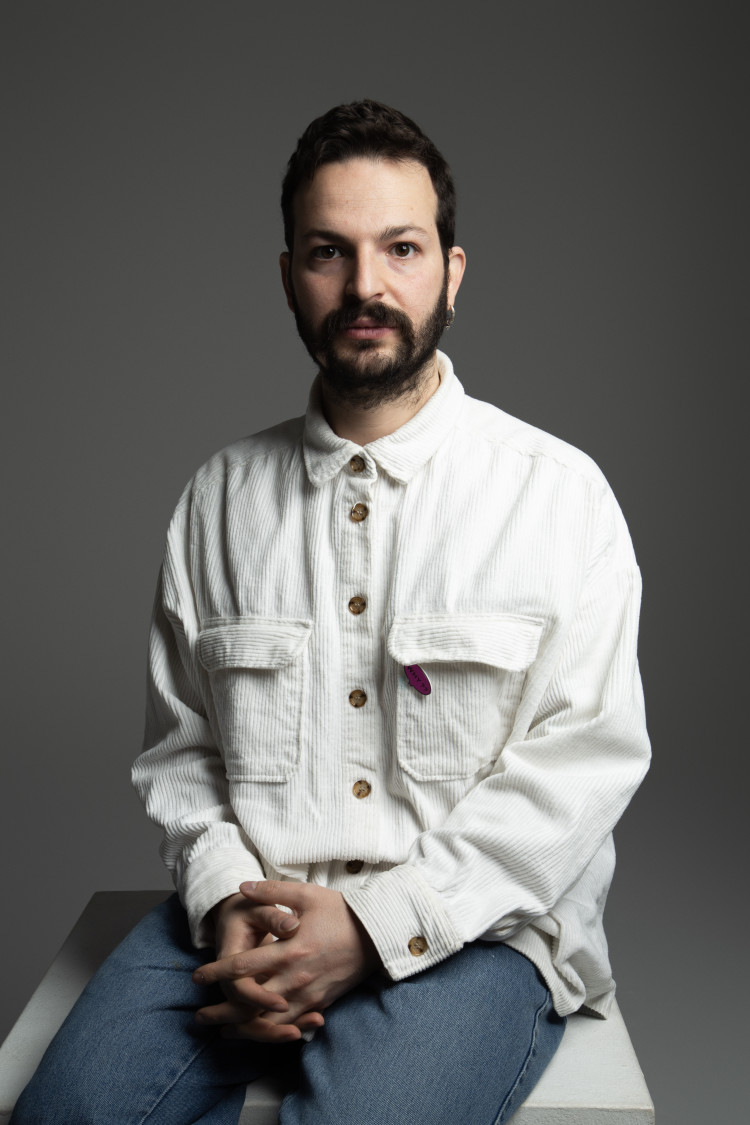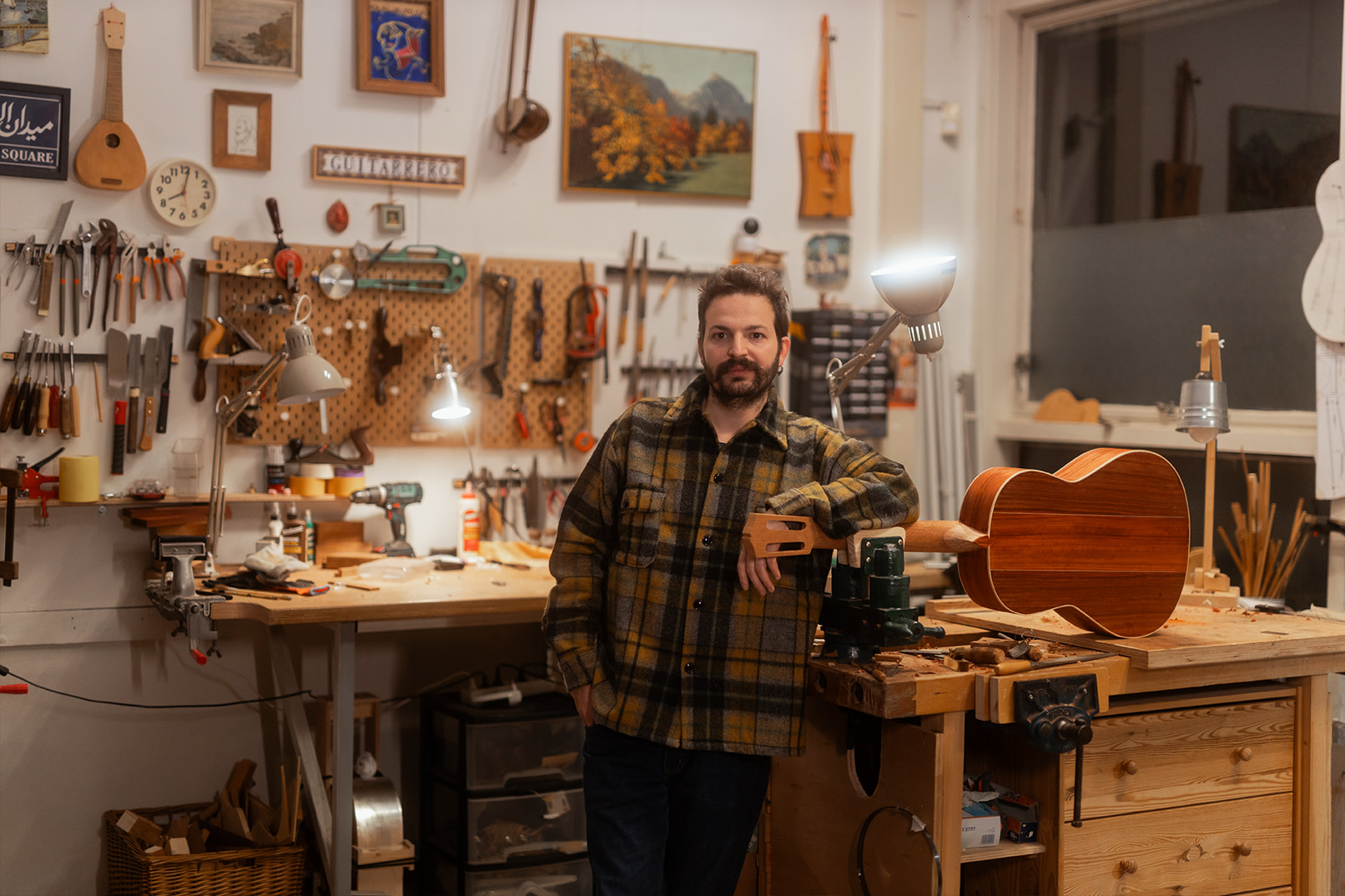
Ahmad
Meet Ahmad Naffory, a multifaceted artist whose journey from the streets of Damascus, Syria, to Beirut, Lebanon, and finally to Amsterdam, has deeply shaped his worldview and artistic expression. His paintings, which are now proudly presented on the walls of the shop at Bouncespace Overtoom, are just a glimpse into the vastness of his talent that spans across music, fine art, and the intricate craft of guitar making. Ahmad's work is a testament to his continuous search for freedom—a theme that resonates deeply within his art and life. But what does freedom truly mean, especially when one has navigated through cultures, faced censorship, and has had to redefine identity across borders? Join us as we delve into his life.
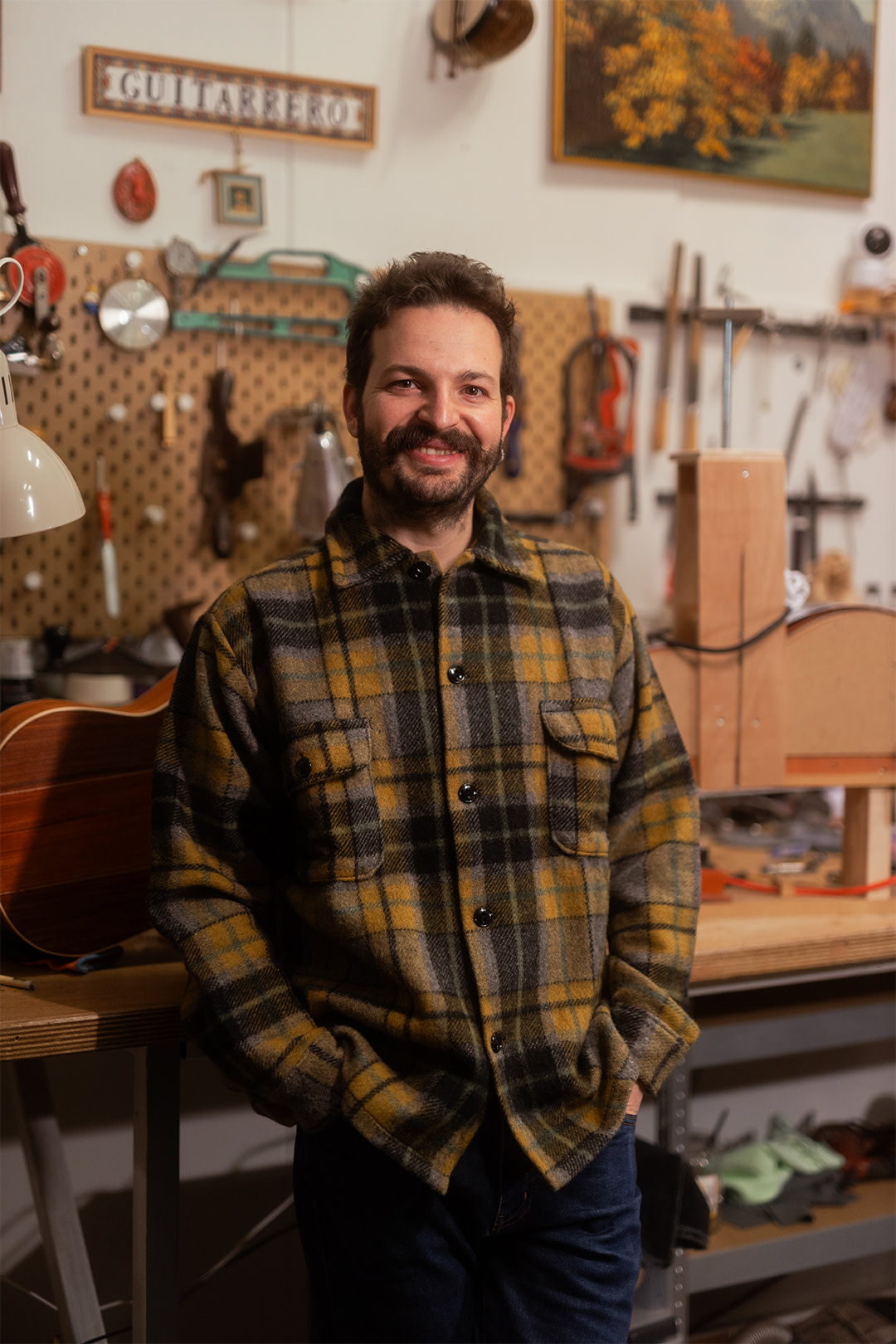
Growing up in Damascus, Syria, must have been an experience filled with contrasts. How did that environment shape you?
Ahmad: Damascus is a city of breathtaking beauty and chaos, a source of endless inspiration. When the revolution began during my studies in fine art, I brought human rights issues to the forefront through my music. It was challenging, pushing me to relocate to Lebanon. In Damascus, my music was political. In Beirut, I formed Aassaleek, which roughly translated means ‘the rebels’: a band that mixed satire with political commentary. Our music, which was both a form of protest and a call for freedom, resonated with many, but also painted a target on my back. The songs I wrote, especially the forbidden ones, were a direct challenge to the oppressors controlling us. Singing about freedom was a defiance against not just the regime but restrictive cultural norms as well. Being part of that band was transformative. We gained a significant following, appeared on TV, and performed bigger gigs. But our fame backfired hard. After a tour in The Netherlands, I got banned from re-entering Beirut. It was surreal. I had to go back to The Netherlands, with just my guitar and one bag. This was about ten years ago.Having faced restrictions on your music in the Middle East, how did you experience having to start all over again in the Netherlands?
Ahmad: In the Netherlands, I discovered a level of freedom of expression that I couldn't have imagined in my homeland. The streets of Amsterdam, especially under the Rijksmuseum, quickly became my new stage, a daily ritual that, despite its initial challenges, was utterly exhilarating. Starting off was tough, with no connections and not a single acquaintance. Yet, the vibrant city presented a safe haven where ideas could be freely shared and explored, a stark contrast to the constraints I had known. As time passed, I began forming connections within the industry, securing more gigs and gradually carving out my own space in this new world. It didn't just enhance my music; it opened doors to other artistic forms of art, like painting and guitar making."Creativity, in its many forms, is what makes us human. It’s what makes us free."
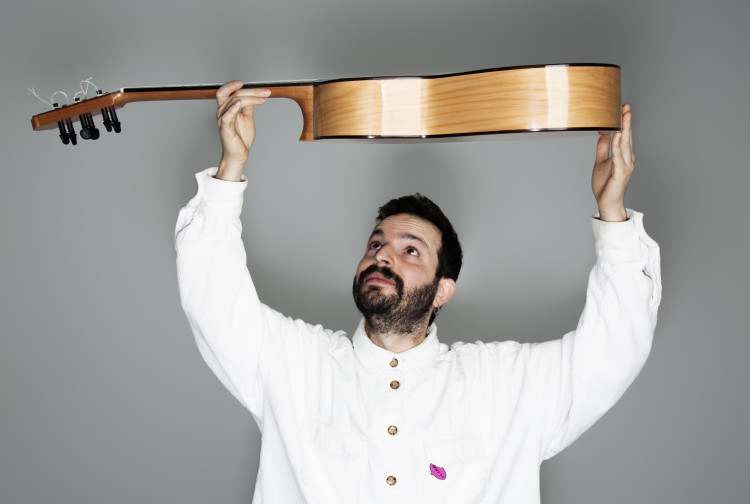
Tell us about your journey into guitar making. What drives your passion in this craft?
Ahmad: Guitar making is an extension of my artistry, where my background in fine arts and my handiness converge. It started with repairing guitars, then evolved into creating them from my own company, called Guitarrero Boutique. To me, each guitar is a unique entity with its own character. The process is deeply creative and technical, my goal is to make the perfect guitar.How does a guitar become perfect, and have you ever created one that you consider perfect?
Ahmad: Crafting an instrument is both an art and a skill, imbued with the same imperfect perfection that characterizes us as humans. Consider our faces, not entirely symmetrical, yet unique and beautiful. Similarly, each handmade guitar possesses its distinct imperfections, mirroring the uniqueness of its player. The harmony between a guitar's character and the musician's personality is what approaches perfection. As for creating the perfect guitar, I believe it's an unattainable goal. I joke that I might retire the day I achieve such perfection. To me, a nearly perfect guitar is lightweight, effortless to play, responsive, and produces rich tones. Yet, perfection is elusive; there's always room for enhancement. Every guitar is a narrative of its own, shaped from wood—a material that retains its vitality. Even as an instrument, wood continues to adapt, contributing to the guitar's evolving soul. It takes a guitar about three weeks to acclimate to its new identity, transitioning from tree to musical companion. This journey from nature to craft underscores a continuous connection to life, making each guitar I've fashioned a perpetual work in progress, far from perfect but deeply resonant.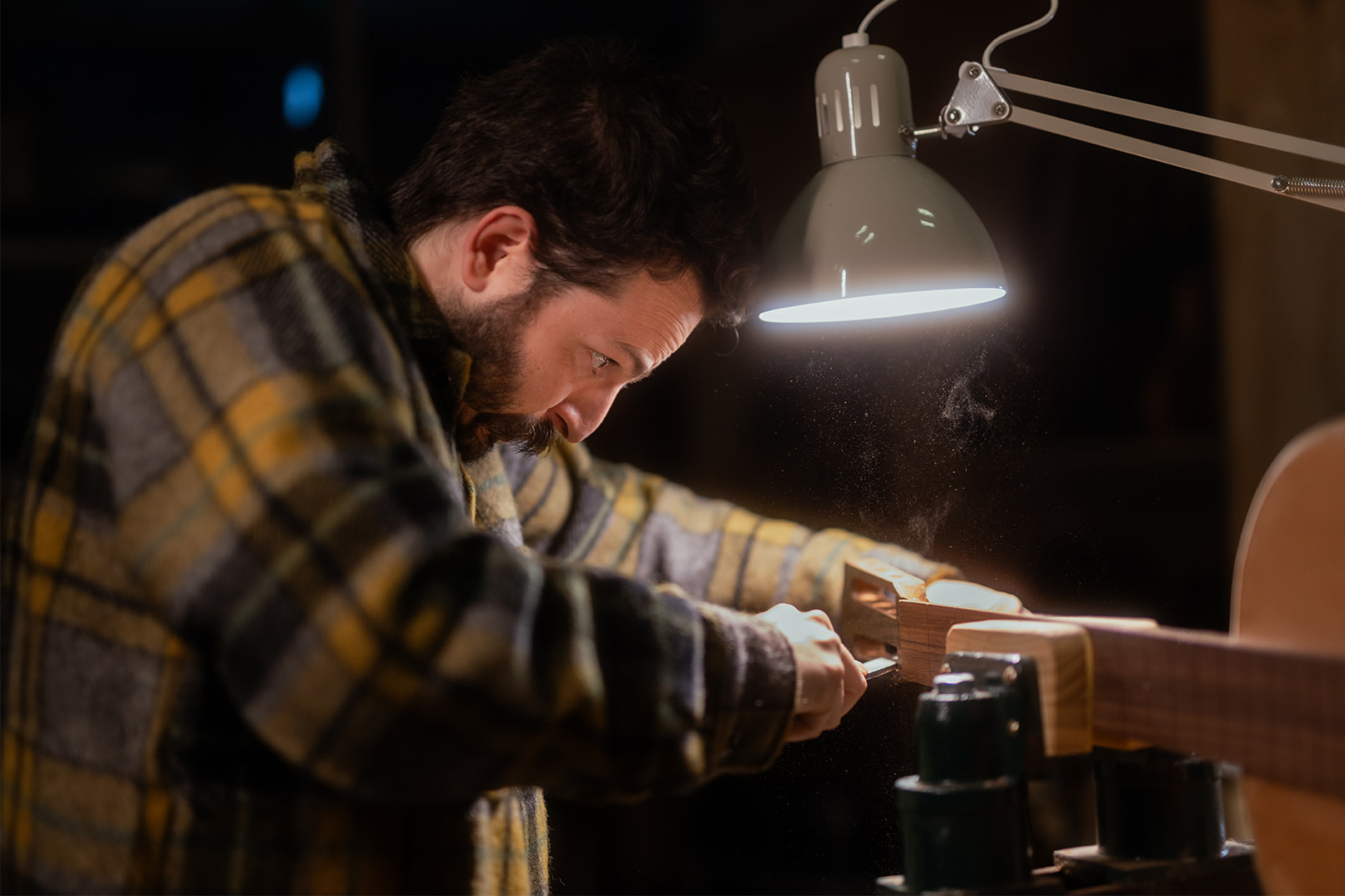
Would you consider yourself a guitar maker now, or an artist?
Ahmad: My life has been a blend of music, art, and activism. All these elements are deeply interconnected for me. It's about breaking free from the boxes society tries to put us in and exploring the full spectrum of human expression. In the Netherlands, I've noticed there's this tendency for people to try and fit everyone into specific boxes. It's like they have a game of categorizing people based on their profession or what they're known for. If you're an artist, that's all you are to them; you're placed in a box labeled 'artist', and it's hard to be recognized as anything beyond that. This approach, though practical, often overlooks the complexity of individual identities. It's a huge contrast to what I'm used to back home in the Middle East, where our culture embraces a more fluid understanding of identity. We value the warmth and richness of being multifaceted. Being an artist doesn't restrict you from being a musician or a craftsman; our society celebrates the blending of talents, not the segregation.Do you think creating is what we’re here for?
Ahmad: Creativity, in its many forms, is what makes us human. It’s what makes us free.A lot of your work is about freedom. Do you feel free?
Ahmad: Freedom is more of an illusion, an idea we're all drawn to. But when you look closer, both physically and mentally, we are bound by various constraints. In Beirut, my sense of freedom was markedly limited compared to here. Yet, even in this perceived freedom, there's a constant struggle to maintain it. Everything around us, from our phones to societal expectations, has the potential to encroach upon our freedom. My music, while centered around the theme of freedom, ironically limits me too, especially when it comes to traveling, since I can’t enter my own country anymore because of it.